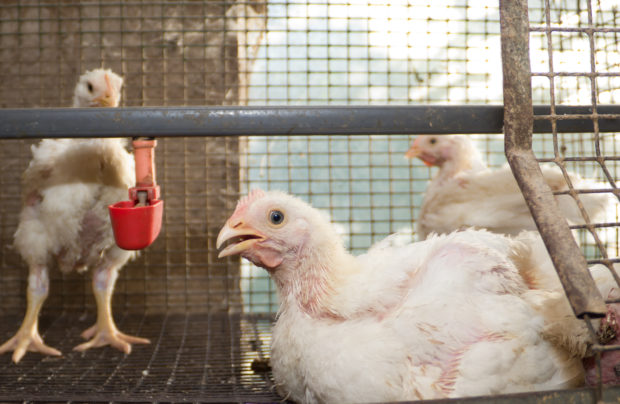
Increased line speeds benefit no one but chicken producers looking to fatten their profits. Even at existing speeds, conditions inside a slaughterhouse are already immensely dangerous and inhumane. Photo by Kharkhan_Oleg/iStock.com
The Biden administration has withdrawn a deplorable pending rule that would have allowed qualifying chicken slaughter plants in the United States to permanently dial up line speeds from an already inhumane and lightning-fast 140 birds per minute to 175 birds per minute.
The U.S. Department of Agriculture’s Food Safety and Inspection Service, under the Trump administration, approved waivers for slaughterhouses to operate at faster speeds. Dozens of chicken slaughterhouses received such waivers, including 16 that received waivers in the spring of 2020. It was a terrible decision given that slaughterhouses had been declared coronavirus hotspots. To add insult to injury, the Trump administration soon after began working on a new rule that would allow qualifying chicken plants to operate at the higher speed, without even applying for a waiver. In essence, chicken producers looking to make more profit could simply ratchet up the line speed to kill more chickens with no consideration for animal welfare or worker safety.
The Humane Society Legislative Fund had been working with key leaders in the House and Senate to advance a shift on this issue, directing the USDA to review its policy in the recently enacted omnibus appropriations package and critical lobbying to urge candidate Biden to speak out about line speeds on the campaign trail. Withdrawing this rule was one of our top priorities for the Biden administration. Next, we will continue to focus on ending the waiver for the dozens of slaughterhouses that are already operating at the higher speeds. We and our allies are already suing the USDA to stop this waiver program and revoke the waivers, and we are urging the USDA, under new leadership, to promptly do so.
Increased line speeds benefit no one but chicken producers looking to fatten their profits. Even at existing speeds, conditions inside a slaughterhouse are already immensely dangerous and inhumane. Workers, struggling to keep up with rapidly moving slaughter lines, grab the chickens and slam them into shackles, injuring the animals’ fragile legs while they’re still conscious. Some birds miss the throat-cutting blade and enter the scalder—a tank of extremely hot water—alive and fully conscious. Human injury rates are also high as workers struggle to keep up with fast-moving lines. Imagine the additional risks to animal welfare and worker safety from increasing line speeds even more.
Faster speeds also further increase the risk of pandemic spread in slaughterhouses, where more than 48,000 workers have already been infected with the coronavirus and at least 245 have died. In fact, other federal agencies, including the Centers for Disease Control and Prevention and the Occupational Safety and Health Administration, had asked that line speeds be slowed down during the pandemic.
We are excited about today’s outcome—it is the right decision for worker safety, animal welfare, food safety and the mitigation of pandemic risk. But there is a great deal more we hope to accomplish in coming weeks and months. President Biden has a strong record on animal protection, and we will be working with his administration to withdraw harmful regulatory actions against animals taken under Trump, including the removal of slaughter speed limits at pig slaughterhouses. We will also work to undo a number of harmful rules finalized by the last administration, including reinstating protections for gray wolves, reversing harmful changes to the Endangered Species Act, and stopping harmful hunting practices on Alaska’s federal lands. It’s a new day, and we are excited to make this one of the best years ever for animal protection policy gains at the federal level.
Sara Amundson is president of the Humane Society Legislative Fund.
The post Biden administration withdraws Trump-era plan for higher line speeds at chicken slaughterhouses appeared first on A Humane World.
Enviroshop is maintained by dedicated NetSys Interactive Inc. owners & employees who generously contribute their time to maintenance & editing, web design, custom programming, & website hosting for Enviroshop.
